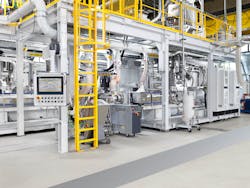KraussMaffei demonstration line features new cutter-compactor unit
A new proprietary cutter-compactor unit is just one of the features on a KraussMaffei line for compounding recycled postconsumer plastic that the company has installed in its R&D Center in Hanover, Germany.
The company calls the new line, which uses its unique EdelweissCompounding technology, “the world’s most modern recompounding line.”
The compounding line is comprised of two ZE 65 BluePower twin-screw extruders.
The use of two twin-screw extruders is novel, according to the company, which says common practice has been to pair a single-screw extruder with a twin-screw extruder for recycling lines.
The benefits of using two twin-screw extruders include improved degassing capacities, more efficient odor removal, better dispersing and gentler melt treatment, according to the company.
Upstream, KraussMaffei’s new cutter-compactor unit prepares scrap plastic prior to its introduction into the first extruder. While rigid plastics with an apparent density of more than 0.3 kilograms per liter can easily be fed directly into the first twin-screw extruder, light and fluffy materials need to be prepared for further processing, according to the company.
The cutter-compactor dries, compacts and homogenizes material, including fiber and film scrap, that has moisture levels as high as 10 percent. Then, it discharges the material onto a belt weigher, which transfers the material into the first ZE 65 BluePower extruder. “This enables gravimetric metering with an accuracy of 99.8 percent,” said Carl-Philip Poepel, director of product management for extrusion technology at KraussMaffei.
The first ZE65 BluePower twin-screw extruder degasses the melt and removes any odors, which is particularly important when recycling postconsumer plastic.
“In addition, the first twin-screw extruder ensures optimum homogenization of the input material that is often characterized by rather inhomogeneous quality,” Poepel said.
After exiting the first extruder, a melt pipe conveys the melt into a second twin-screw extruder, which performs the actual compounding.
“Filling, reinforcing, pigmenting and incorporation of additives – the twin-screw extruder is designed for any given process task,” Poepel said. The extruder is outfitted with gravimetric metering systems for introducing various media. The downstream equipment includes fine filters, pumps and a BKG pelletizing system from Nordson Corp.
By eliminating metering variations that tend to occur with light materials, all postconsumer LDPE, HDPE, PP and PS now can be processed easily into high-quality compounds and used as a substitute for new resin in both injection molding and extrusion applications, according to the company.
Since the EdelweissCompounding line is sold as a turnkey system, installation and setup are fast and easy, according to the company. When delivered, the line needs only to be connected to electricity, water and compressed air, and users can start production immediately. In the event of relocation, the system can be transported as a whole and would be immediately ready for production without any changes.
“Interested customers can carry out industrial-scale trials on the new state-of-the-art EdelweissCompounding line in our R&D center and convince themselves of the benefits offered by the overall modular-design plant concept,” Poepel said.
Contact: Krauss-Maffei Corp., Florence, Ky., 859-283-0200, www.kraussmaffei.com
